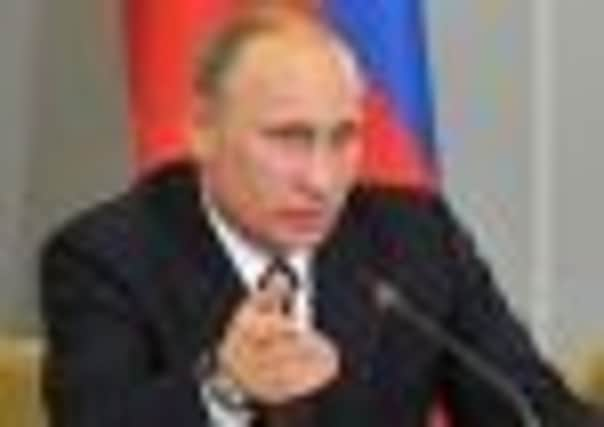Presidential shoo-in rankles Russians


An unprecedented wave of massive protests in recent months has showed a substantial portion of the population are fed up with the political entrenchment engineered by Putin since he first became president in 2000, and police are preparing for the possibility of post-election unrest in Moscow.
Putin has repeatedly alleged that the protesters are stooges of America and Western European countries that want to undermine Russia.
Advertisement
Hide AdAdvertisement
Hide AdHowever, in an interview broadcast on state television last week he sought to put a positive spin on protests that have been held against his 12-year rule, saying they were a “good experience for Russia”.
“That situation has helped make government structures more capable, has raised the need for them to think, search for solutions and communicate with society,” he said.
Putin promised to engage in dialogue with the protesters, but rejected the opposition’s main demand to hold a rerun of December’s parliamentary election, which was tainted by widespread voting fraud that was reported by foreign and Russian election observers. Putin’s United Russia party barely hung on to its majority in the Duma.
The evidence of vote-rigging fuelled protests in Moscow that drew tens of thousands of people in the largest show of discontent since the collapse of the Soviet Union in 1991. The opposition is gearing up for another massive protest against what it fears will be manipulation of today’s vote.
In the past week, the rhetoric became harsher as Putin publicly suggested the opposition was willing to kill one of its own figures in order to stoke outrage against him. That claim came on the heels of state television reports that a plot by Chechen rebels to kill Putin after the election had been foiled in the southern city of Odessa. Some of Putin’s election rivals dismissed the report as a campaign trick to boost his support.
Protests after the election now appear certain.
“People in Russia are not going to recognise Putin’s victory in the first round,” Alexei Navalny, one of the loosely-knit opposition’s most charismatic figures, said this weekend.
Another prominent protest figure, Ilya Ponomarev, a parliament member from the opposition A Just Russia party, said the protesters’ mood has become more truculent as authorities brushed off their initial demands for the results of the December parliament election to be nullifed. He said: “It has evolved from ‘we demand a rerun’ to ‘go to hell’.”
The interior ministry is calling in 6,000 police reinforcements to the capital from other regions, the state news agency Itar-Tass reported on Friday.
Advertisement
Hide AdAdvertisement
Hide AdWhether today’s vote is seen as fair and transparent is likely to be key; a count without reports of wide violations could deprive protesters of a galvanising issue.
The Putin system of so-called “managed democracy” has put liberal opposition forces under consistent pressure, allowing them only rare permission to hold small rallies and bringing squads of police to brusquely break up any unauthorised gatherings.
The Kremlin has gained control of all major television channels and their news reports have turned into uncritical recitations of Putin’s policy successes, often augmented with admiring footage of him riding on horseback, scuba-diving or patting wild animals.
But the protests, sparked by allegations of widespread fraud in December’s parliamentary elections, did force notable changes.
Authorities gave grudging permission for opposition rallies that attracted vast crowds, upward of 50,000 in Moscow. State television gave them substantial and mostly neutral coverage.
Whether that tolerance will last after the election is unclear. According to the most recent survey by the independent Levada Centre polling agency, Putin is on track to win the election with around two-thirds of the vote against four challengers. This is enough to bolster his irritable denunciations of the protesters as a small, coddled minority.
As the first protests rolled across the country, Putin announced an expensive program to place two web cameras in each of the country’s 90,000 polling stations, one showing a general view and one focusing on the ballot box. However, their effectiveness is in doubt.
“Cameras cannot capture all the details of the voting process, in particular during counting,” the election observation mission of the Organisation for Security and Co-operation in Europe (OSCE) noted in a report on election preparations.
Advertisement
Hide AdAdvertisement
Hide AdAlong with the OSCE mission, tens of thousands of Russians have volunteered as election observers, receiving training from activist groups on how to recognise vote-rigging, and how to record and report violations.
In the December election, observers from the non-governmental group Golos reported being threatened and kicked out of polling stations. Hostility to the group among officials remains. In January, the head of the Federal Security Service in the Komi republic called the group “extremists” inspired from abroad.
“The Russian government has done the right thing by allowing unprecedented public protests and proposing some reforms,” Hugh Williamson, of the international watchdog Human Rights Watch, said in a statement. But “despite the positive developments, the climate for civil society is as hostile as it ever was.”
In his past four years as prime minister – a role he took because of a constitutional limit of two consecutive presidential terms – Putin has remained Russia’s dominant political figure, overshadowing successor Dmitry Medvedev, who spoke often of reforms but did little. Putin has pledged to make Medvedev his premier.